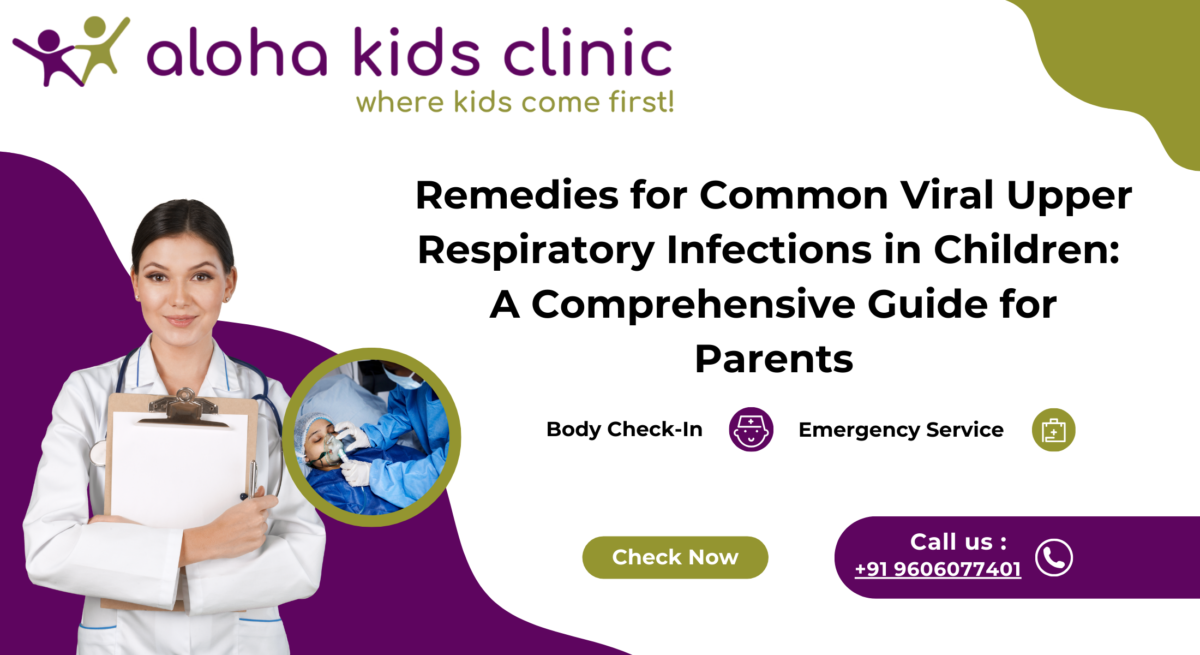When your little one is sniffling and coughing, your heart might ache just as much as their throat does. Upper Respiratory Infections (URIs), often caused by viruses, are common in children. These may include the common cold, influenza, and others, with symptoms such as sore throat, cough, runny nose, and sometimes fever. This article aims to guide parents on what to do and what not to do when dealing with URIs, as well as understanding the warning signs that necessitate a visit to the pediatrician or Emergency Department.
Cold medicines should not be given to children under 4 years of age and should be used with caution in older children.
Antibiotics are not effective against viruses. They should only be used if a bacterial infection is present, as prescribed by a healthcare provider.
Never give aspirin to children or teenagers with a viral infection. It is associated with Reye’s syndrome, a rare but serious condition.
Cigarette smoke and strong odors can make symptoms worse. Maintain a clean environment.
It’s common for children to lose their appetite during an infection. Focus on hydration and offer easy-to-digest foods.
If your child is breathing rapidly, has a bluish hue around the lips or is using extra muscles to breathe, it’s crucial to seek medical help immediately.
A persistent high fever, especially above 104°F (40°C) or any fever in an infant less than three months old, should be evaluated by a healthcare professional.
A cough that interferes with breathing or sleeping, or if whooping sound or wheezing is present, needs medical attention.
Signs of dehydration include sunken eyes, dry mouth, decreased urine output, or no tears when crying. This necessitates prompt medical care.
This could indicate an ear infection. Consult the pediatrician if your child complains of ear pain or if there’s discharge from the ear.
A rash coupled with a fever can be indicative of various conditions, some of which can be serious. Contact your pediatrician.
If your child is unable to swallow or is drooling excessively, seek medical care. It might indicate a more severe throat infection.
If your child is unusually sleepy, irritable, or not responding normally, it is a red flag that needs immediate medical attention.
Visit the Pediatrician: For mild to moderate symptoms such as low-grade fever, mild cough, ear pain, or if symptoms are not improving after 3-5 days. The pediatrician will evaluate the child and can advise on appropriate treatments.
Consider visiting the pediatrician if the child has other medical problems like Asthma, Chronic Lung Disease and cardiac problems
Go to the Emergency Department: If your child exhibits severe symptoms such as high fever, difficulty breathing, severe cough, signs of dehydration, or any change in mental status, it is imperative to seek emergency care immediately. These symptoms could be indicative of a severe infection or complication and need to be addressed urgently.
While upper respiratory infections are common in children and often resolve on their own with supportive care, it’s essential for parents to know how to alleviate symptoms safely and be vigilant about the warning signs that indicate a more serious condition. Through a combination of home remedies, avoiding certain practices, and understanding when to seek medical help, parents can navigate the often-tricky waters of their child’s illness and ensure they receive the best care possible. Remember, always consult your healthcare provider for advice and information tailored to your child’s specific health needs.
Please explore other pediatric healthcare related topics on alohakidsclinic.com and if required you can schedule an in-person or telemedicine appointment.
Introduction:What to Do:1. Avoid Over-The-Counter Cold Medicines for Young Children2. Don’t Use Antibiotics Unless Necessary3. Avoid Aspirin4. Don’t Expose Them to Irritants5. Don’t Force Them to EatSigns and Symptoms to Watch For:1. Trouble Breathing2. High Fever3. Severe or Persistent Cough4. Dehydration5. Ear Pain or Drainage6. Rash7. Sore Throat with Difficulty Swallowing8. Lethargy or Change in Mental StatusWhen to See the Pediatrician or Visit the Emergency Department:In Summary
Blogs
+91 96060 77401 Aloha Kids Clinic admin@alohakidsclinic.com Sign up for the Aloha newsletter to receive all the news offers and discounts from the Aloha Kids clinic.
+91 96060 77401 Aloha Kids Clinic admin@alohakidsclinic.com Sign up for the Aloha newsletter to receive all the news offers and discounts from Aloha Kids clinic.
Copyright by Aloha Kids Clinic,2023. All rights reserved.
Copyright by Aloha kids clinic,2023 All rights reserved.
Contact us
Call us
Visit us at
No 531, 2nd Floor,
Nammalaya Building
Doddakallasandra,
Bangalore – 560062Send us an email
About us
Subscribe
Contact us
Call us
Visit us at
No 531, 2nd Floor,
Nammalaya Building,
Doddakallasandra,
Bangalore – 560062Send us an email
About us
Subscribe

